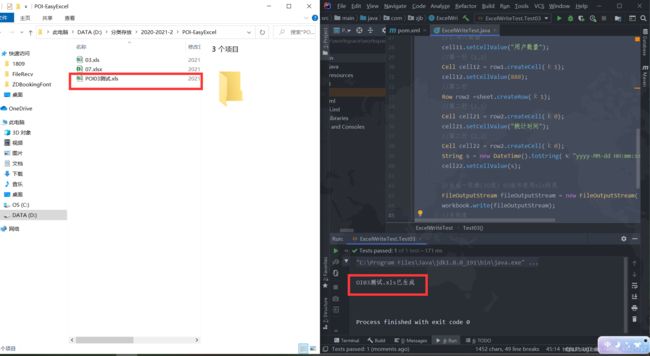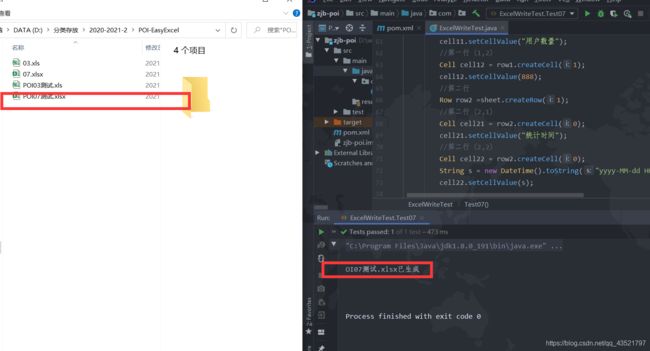POI及EasyExcel使用
POI和EasyExcel
使用场景
1、讲用户的信息导出Excel表格(导出数据…)
2、将Excel表中的信息录入到网站数据库(大量信息上传),减轻网站录入量!
开发中经常会设计到Excel的处理,如Excel的导出,Excel导入数据库!
目前操作Excel比较流行的就是Apache POI 和阿里巴巴的 easyExcel!
Apache POI
Apache POI官网:https://poi.apache.org/
easyExcel
easyExcel 官网:https://github.com/alibaba/easyexcel

EasyExcel是阿里巴巴开源的一个excel处理框架,以使用简单、节省内存著称。
EasyExcel能大大减少占用内存的主要原因是在解析Excel时没有将文件数据一次性全部加载到内存中,而是从磁盘上一行行读取数据,逐个解析。
内存问题:POI是 全部先加载到内存OOM,在写入文件。EasyExcel 是一行一行读,逐个解析。
下图是EasyExcel和POI在解析Excel时的对比图。
easyExcel 文档:https://alibaba-easyexcel.github.io/
https://www.yuque.com/easyexcel/doc/
POI-Excel写
创建项目
1、创建maven项目
2、导入pom依赖
<dependencies>
<dependency>
<groupId>org.apache.poigroupId>
<artifactId>poiartifactId>
<version>3.9version>
dependency>
<dependency>
<groupId>org.apache.poigroupId>
<artifactId>poi-ooxmlartifactId>
<version>3.9version>
dependency>
<dependency>
<groupId>joda-timegroupId>
<artifactId>joda-timeartifactId>
<version>2.10.1version>
dependency>
<dependency>
<groupId>junitgroupId>
<artifactId>junitartifactId>
<version>4.12version>
dependency>
dependencies>
03 | 07版本的写,就是对象不同,方法一样
需要注意:03版本和07版本存在兼容性问题!03最多65535行!07无限制!
注意03版本和07版本的后缀不同

package com.zjb;
import org.apache.poi.hssf.usermodel.HSSFWorkbook;
import org.apache.poi.ss.usermodel.Cell;
import org.apache.poi.ss.usermodel.Row;
import org.apache.poi.ss.usermodel.Sheet;
import org.apache.poi.ss.usermodel.Workbook;
import org.joda.time.DateTime;
import org.junit.Test;
import java.io.FileOutputStream;
public class ExcelWriteTest {
String path="D:\\分类存放\\2020-2021-2\\POI-EasyExcel";
@Test
public void Test03() throws Exception {
//1.创建工作簿
Workbook workbook=new HSSFWorkbook();
//2.创建一个工作表
Sheet sheet = workbook.createSheet("用户统计表");
//3.创建一行
Row row1 =sheet.createRow(0);
//4.创建一个单元格(1,1)
Cell cell11 = row1.createCell(0);
//5.写入数据
cell11.setCellValue("用户数量");
//第一行(1,2)
Cell cell12 = row1.createCell(1);
cell12.setCellValue(888);
//第二行
Row row2 =sheet.createRow(1);
//第二行(2,1)
Cell cell21 = row2.createCell(0);
cell21.setCellValue("统计时间");
//第二行(2,2)
Cell cell22 = row2.createCell(0);
String s = new DateTime().toString("yyyy-MM-dd HH:mm:ss");
cell22.setCellValue(s);
//生成一张表(IO流) 03版本使用xls结尾
FileOutputStream fileOutputStream = new FileOutputStream(path + "/POI03测试.xls");
workbook.write(fileOutputStream);
//关闭流
fileOutputStream.close();
System.out.println("OI03测试.xls已生成");
}
}
结果


07版本测试代码
上面已经说过了03 | 07版本的写,就是对象不同,方法一样

@Test
public void Test07() throws Exception {
//1.创建工作簿 07
Workbook workbook=new XSSFWorkbook();
//2.创建一个工作表
Sheet sheet = workbook.createSheet("用户统计表");
//3.创建一行
Row row1 =sheet.createRow(0);
//4.创建一个单元格(1,1)
Cell cell11 = row1.createCell(0);
//5.写入数据
cell11.setCellValue("用户数量");
//第一行(1,2)
Cell cell12 = row1.createCell(1);
cell12.setCellValue(888);
//第二行
Row row2 =sheet.createRow(1);
//第二行(2,1)
Cell cell21 = row2.createCell(0);
cell21.setCellValue("统计时间");
//第二行(2,2)
Cell cell22 = row2.createCell(0);
String s = new DateTime().toString("yyyy-MM-dd HH:mm:ss");
cell22.setCellValue(s);
//生成一张表(IO流) 07版本使用xlsx结尾
FileOutputStream fileOutputStream = new FileOutputStream(path + "/POI07测试.xlsx");
workbook.write(fileOutputStream);
//关闭流
fileOutputStream.close();
System.out.println("OI07测试.xlsx已生成");
}
大文件写HSSF(03版)
缺点:最多只能处理65536行,否则会抛出异常。
java.lang.IllegalArgumentException: Invalid row number (65536) outside allowable range (0..65535)
优点:过程中写入缓存。不操作磁盘,最后一次性写入磁盘,速度快。
@Test
public void testWrite03BigData() throws IOException {
//时间
long begin=System.currentTimeMillis();
//创建一个薄
Workbook workbook = new HSSFWorkbook();
//创建表
Sheet sheet = workbook.createSheet();
//写入数据
for (int rowNum = 0; rowNum < 65536 ; rowNum++) {
//创建行
Row row = sheet.createRow(rowNum);
for (int cellNum = 0; cellNum < 10; cellNum++) {
//创建列
Cell cell = row.createCell(cellNum);
cell.setCellValue(cellNum);
}
}
System.out.println("over");
FileOutputStream outputStream = new FileOutputStream(path + "/03版速度测试");
workbook.write(outputStream);
outputStream.close();
long end=System.currentTimeMillis();
System.out.println((double) (end-begin)/1000);
}
大文件写XSSF(07版)
缺点:写数据时速度非常慢,非常耗内存,也会发生内存溢出,如100万条
优点:可以写较大的数据量,如20万条
@Test
public void testWrite07BigData() throws Exception {
//时间
long begin=System.currentTimeMillis();
//创建一个薄
Workbook workbook = new XSSFWorkbook();
//创建表
Sheet sheet = workbook.createSheet();
//写入数据
for (int rowNum = 0; rowNum < 65537 ; rowNum++) {
//创建行
Row row = sheet.createRow(rowNum);
for (int cellNum = 0; cellNum < 10; cellNum++) {
//创建列
Cell cell = row.createCell(cellNum);
cell.setCellValue(cellNum);
}
}
System.out.println("over");
FileOutputStream outputStream = new FileOutputStream(path + "/07版速度测试.xlsx");
workbook.write(outputStream);
outputStream.close();
long end=System.currentTimeMillis();
System.out.println((double) (end-begin)/1000);
}
大文件写SXSSF
优点:可以写非常大的数据量,如100万条甚至更多条,写数据速度快,占用更少的内存。
注意:
过程中会产生临时文件,需要清理临时文件
默认由100条记录被保存在内存中,如果超过这数量,则最前面的数据被写入临时文件
如果想自定义内存中数据的数量,可以使用new SxsSFWorkbook(数量)
@Test
public void testWrite07BigDataS() throws Exception {
//时间
long begin=System.currentTimeMillis();
//创建一个薄
Workbook workbook = new SXSSFWorkbook();
//创建表
Sheet sheet = workbook.createSheet();
//写入数据
for (int rowNum = 0; rowNum < 65537 ; rowNum++) {
//创建行
Row row = sheet.createRow(rowNum);
for (int cellNum = 0; cellNum < 10; cellNum++) {
//创建列
Cell cell = row.createCell(cellNum);
cell.setCellValue(cellNum);
}
}
System.out.println("over");
FileOutputStream outputStream = new FileOutputStream(path + "/07版速度测试S.xlsx");
workbook.write(outputStream);
outputStream.close();
//清除临时文件
((SXSSFWorkbook)workbook).dispose();
long end=System.currentTimeMillis();
System.out.println((double) (end-begin)/1000);
}

SXSSFWorkbook-来至官方的解释∶实现"BigGridDemo"策略的流式XSSFWorkbook版本。这允许写入非常大的文件而不会耗尽内存,因为任何时候只有可配置的行部分被保存在内存中。
请注意,仍然可能会消耗大量内存,这些内存基于您正在使用的功能,例如合并区域,注解…….仍然只存储在内存中,因此如果广泛使用,可能需要大量内存。
POI-Excel读
03|07
03版本
String path="D:\\分类存放\\2020-2021-2\\POI-EasyExcel";
@Test
public void testRead03() throws Exception {
//获取文件流
FileInputStream inputStream = new FileInputStream(path+"/POI03测试.xls");
//创建一个工作簿,使用Excel能操作的这里都有都可以操作
Workbook workbook=new HSSFWorkbook(inputStream);
//得到表
Sheet sheet = workbook.getSheetAt(0);
//得到行
Row row = sheet.getRow(0);
//得到列
Cell cell = row.getCell(1);
//读取的时候要注意类型
//getStringCellValue()字符串
//getNumericCellValue()数字
//等等
//System.out.println(cell.getStringCellValue());
System.out.println(cell.getNumericCellValue());
inputStream.close();
}
07版本
还是只需要改一下对象名即可!
String path="D:\\分类存放\\2020-2021-2\\POI-EasyExcel";
@Test
public void testRead07() throws Exception {
//获取文件流
FileInputStream inputStream = new FileInputStream(path+"/POI07测试.xlsx");
//创建一个工作簿,使用Excel能操作的这里都有都可以操作
Workbook workbook=new XSSFWorkbook(inputStream);
//得到表
Sheet sheet = workbook.getSheetAt(0);
//得到行
Row row = sheet.getRow(0);
//得到列
Cell cell = row.getCell(1);
//读取的时候要注意类型
//getStringCellValue()字符串
//getNumericCellValue()数字
//等等
//System.out.println(cell.getStringCellValue());
System.out.println(cell.getNumericCellValue());
inputStream.close();
}
注意数据类型
读取不同的数据类型(非常麻烦)
@Test
public void testCellType() throws Exception {
//获取文件流
FileInputStream inputStream = new FileInputStream(path + "/数据类型测试.xls");
//创建一个工作簿
Workbook workbook=new HSSFWorkbook(inputStream);
//获取表
Sheet sheet = workbook.getSheetAt(0);
//获取标题内容 (也就是第一行)
Row rowTitle = sheet.getRow(0);
if (rowTitle!=null){
//重要 获取一行有多少个单元格
int cellCount = rowTitle.getPhysicalNumberOfCells();
for (int cellNum = 0; cellNum < cellCount; cellNum++) {
Cell cell = rowTitle.getCell(cellNum);
if (cell!=null){
//获取单元格类型
int cellType = cell.getCellType();
//
String cellValue = cell.getStringCellValue();
System.out.print(cellValue+" | ");
}
}
System.out.println();
}
//获取表中的内容
//获取总行数
int rowCount = sheet.getPhysicalNumberOfRows();
for (int rowNum = 1; rowNum < rowCount; rowNum++) {
Row rowData = sheet.getRow(rowNum);
if (rowData!=null){
//读取列
int cellCount = rowTitle.getPhysicalNumberOfCells();
for (int cellNum = 0; cellNum <cellCount ; cellNum++) {
System.out.print("["+(rowNum+1)+"-"+(cellNum+1)+"]");
Cell cell = rowData.getCell(cellNum);
//匹配列数据类型
if(cell!=null){
int cellType = cell.getCellType();
String cellValue="";
switch (cellType){
case HSSFCell.CELL_TYPE_STRING:
System.out.print("【String】");
cellValue=cell.getStringCellValue();
break;
case HSSFCell.CELL_TYPE_BOOLEAN:
System.out.print("【BOOLEAN】");
cellValue=String.valueOf(cell.getBooleanCellValue());
break;
case HSSFCell.CELL_TYPE_BLANK:
System.out.print("【BLANK】");
break;
case HSSFCell.CELL_TYPE_NUMERIC:
System.out.print("【NUMERIC】");
if (HSSFDateUtil.isCellDateFormatted(cell)){
System.out.print("【日期】");
Date date = cell.getDateCellValue();
cellValue= new DateTime(date).toString("yyyy-MM-dd");
}else {
//不是日期格式,防止数字过长
System.out.print("【转换为字符串输出】");
cell.setCellType(HSSFCell.CELL_TYPE_STRING);
cellValue =cell.toString();
}
break;
case HSSFCell.CELL_TYPE_ERROR :
System.out.print("【数据类型错误】");
}
System.out.print(cellValue);
}
}
}
}
inputStream.close();
}
计算公式(了解)
@Test
public void testFormula() throws Exception{
FileInputStream InputStream = new FileInputStream(path + "/公式.xls");
Workbook workbook = new HSSFWorkbook(InputStream);
Sheet sheet = workbook.getSheetAt(0);
Row row = sheet.getRow(4);
Cell cell = row.getCell(0);
//拿到计算公式
FormulaEvaluator formulaEvaluator = new HSSFFormulaEvaluator((HSSFWorkbook) workbook);
//输出单元格的内容
int cellType = cell.getCellType();
switch (cellType){
case Cell.CELL_TYPE_FORMULA://公式
String formula = cell.getCellFormula();
System.out.println(formula);
//计算
CellValue evaluate = formulaEvaluator.evaluate(cell);
String cellValue = evaluate.formatAsString();
System.out.println(cellValue);
break;
}
InputStream.close();
}
EasyExcel操作
导入依赖
<dependency>
<groupId>com.alibabagroupId>
<artifactId>easyexcelartifactId>
<version>2.2.0-beta2version>
dependency>
<dependency>
<groupId>org.projectlombokgroupId>
<artifactId>lombokartifactId>
<version>1.18.12version>
dependency>
<dependency>
<groupId>com.alibabagroupId>
<artifactId>fastjsonartifactId>
<version>1.2.62version>
dependency>
读写测试在文档写的非常的详细。
https://www.yuque.com/easyexcel/doc/








